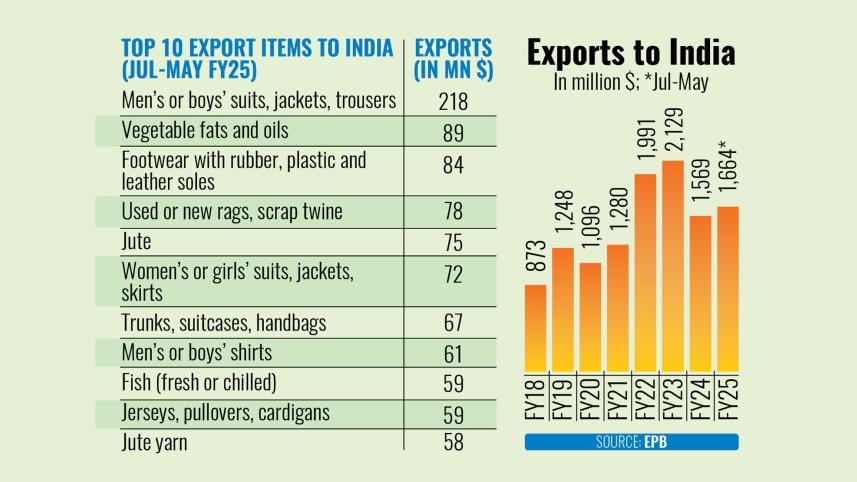Exporters fear losses as India slaps new restrictions

Bangladesh's exporters fear losses as India has barred the import of several products—including some jute items—through land ports, threatening crucial trade flows and millions of dollars in earnings.
Exporters warn that though the products are allowed to enter through Maharashtra's Nhava Sheva Port, costs would rise sharply and undercut Bangladesh's competitiveness not only in the jute sector but across multiple sectors reliant on smooth cross-border trade.
Industry insiders say the new restrictions could deepen Bangladesh's export woes at a time when global demand remains fragile and other sectors—from garments to processed foods—also face trade hurdles.
They caution that prolonged barriers risk damaging Bangladesh's overall export performance and jeopardising the country's preferential market access to India, potentially delivering a significant blow to the economy.
On June 27, India imposed a ban on the import of certain jute products and woven fabrics from Bangladesh through land ports.
However, according to a notification from India's Directorate General of Foreign Trade, these products will still be permitted for import, but only through the Nhava Sheva Port.
On May 17, India banned the import of certain goods from Bangladesh through land ports, including readymade garments, fruits, processed foods, soft drinks, yarn, plastic and PVC products, and wooden furniture.
Previously, on April 15, Bangladesh banned the import of cotton, specifically yarn, from India through land ports to protect the domestic textile and spinning industry from what it perceived as unfair competition from cheaper Indian yarn.
Bangladesh exported goods worth $1.7 billion to India in FY 2023-24, according to data from the Export Promotion Bureau (EPB).
In the July-May period of the current fiscal year, it totalled $1.6 billion.
Bangladesh's export earnings from jute and jute goods fell by 16.16 percent year-on-year to $855.23 million in fiscal year 2023-24, down from $912 million in FY 2022-23.
This marks the third consecutive year of decline for the sector, which has been grappling with falling global demand and shifting market dynamics.
Between July and May of the current fiscal year, Bangladesh fetched $133 million from the export of raw jute and jute yarn, the EPB figures show.
"Bangladeshi exporters will now be unable to export jute and jute products due to a recent notification from India's Directorate General of Foreign Trade," said Mirza Koushik Ahmed, executive director of Reliance Jute Mills Ltd, situated in Keraniganj, Dhaka.
"Our jute exporters have become victims of politics, as bilateral relations between Bangladesh and India are currently strained," he said.
Ahmed said the route to the Nhava Sheva Port was not commercially viable for exporting jute products, given the additional logistics costs and transit times involved.
He said this restriction would severely impact Bangladesh's jute sector and the export of associated products—around 300 tonnes—to India per month.
Farhad Ahmed Akanda, chairman of the Bangladesh Jute Association, said the export restrictions through the land ports between Bangladesh and India would severely impact jute and jute goods exports.
"The cost for our buyers will increase because they will have to take delivery from the port. Besides, our cost of shipment through the Chattogram and Mongla ports will rise," he said.
Bangladesh exports around 13 lakh bales of raw jute, and India accounts for most of the shipment.
Akanda said most of their buyers were based in Kolkata and it would be convenient for them if India allowed shipments through the Kolkata port.
"Our buyers are pursuing the Indian authorities to allow shipments through Kolkata," he said, adding that no buyer has cancelled orders until now.
"They are assessing the cost," said Akanda.
Mohammad Hatem, president of the Bangladesh Knitwear Manufacturers and Exporters Association (BKMEA), said restrictions on imports through land ports were having a significant economic impact.
At the same time, it is not feasible for Indian importers to avail jute and jute products via Mumbai, he said.
"Against this backdrop, we need to explore alternative solutions to overcome these challenges and to promote greater use of jute," he said.
He further noted that businesses involved in the jute sector were likely to face substantial difficulties.
However, Tahmidul Islam, owner of jute and jute product exporter Baeki Centre, sees India's ban on raw jute exports as a boon for the industry in Bangladesh, easing competition from West Bengal mills and curbing past price spikes.
"It's been good for us," he told The Daily Star.
He believes local production of yarn and finished goods can boost exports and market growth.
Yet he warns of smuggling risks and apprehends that lower raw jute prices might squeeze farmers' profits. "Overall, the situation is favourable," he added.
Bangladesh's exports to India could face setbacks due to new restrictions on several items, warned Mustafizur Rahman, a distinguished fellow at the Centre for Policy Dialogue (CPD).
He said jute exports must now take place via Mumbai's Nhava Sheva Port instead of land routes, raising costs and hurting competitiveness in a sector where India is a strong rival.
Restrictions on readymade garments and other products will also intensify competition with Indian producers and exporters from countries unaffected by such curbs, he said.
Though Bangladesh has imposed similar measures on Indian imports, dialogue is required to ease tensions, Rahman said.
He cautioned that persistent barriers could even jeopardise Bangladesh's zero-duty access to India, which would be a major blow for exports.




 For all latest news, follow The Daily Star's Google News channel.
For all latest news, follow The Daily Star's Google News channel.
Comments